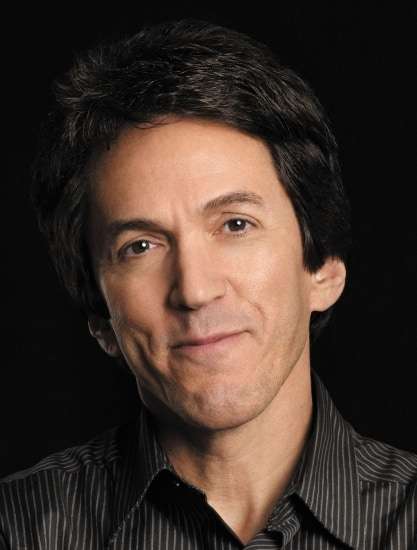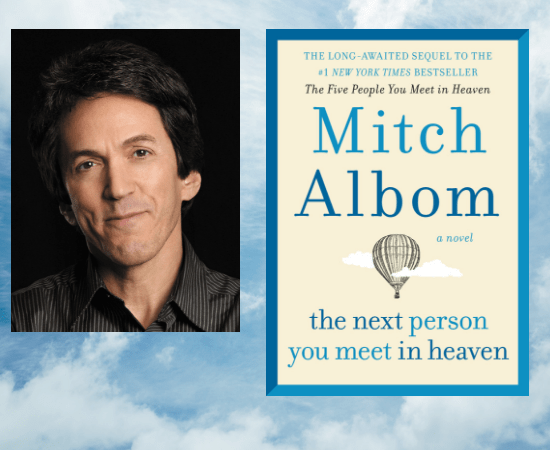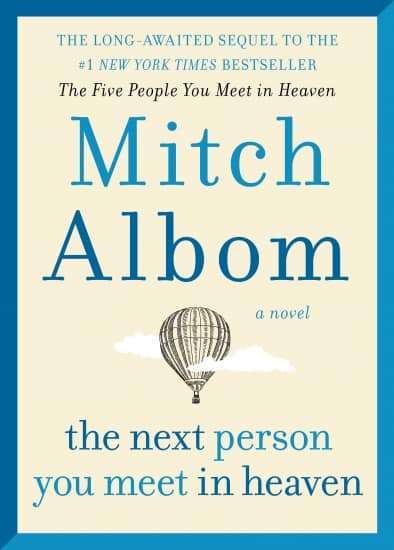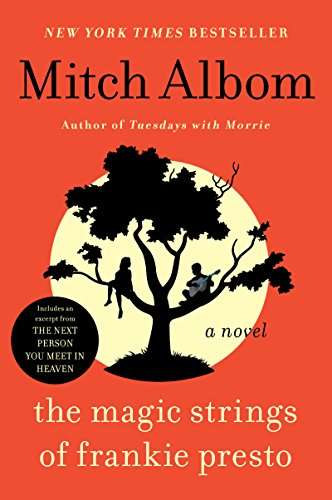“I always carried the idea that when you die, there are these people sitting there waiting for you.”
If ever there was an author who could paint a tangible picture of heaven and imagine it as a kind of post-life waiting room, it is Mitch Albom, first with his iconic bestseller The Five People You Meet in Heaven and now with his just-released sequel, The Next Person You Meet in Heaven (Harper).
The author, well known for Tuesdays With Morrie and his more current The Magic Strings of Frankie Presto, said in a recent BookTrib interview, “Of all the books that I’ve written, The Five People You Meet in Heaven is the one I’ve heard the most questions over the years about what happens next. What happens to Eddie next? They know that the five people is just the first stage of heaven, but not the final stage.”
Albom tells BookTrib, “In the last five years though, I’ve had my share of personal loss, my mother and father, and a little girl we were raising from Haiti. I saw loss on the younger and older sides and it got me thinking quite a bit about heaven, my mind was wandering there anyhow. I was hoping and wondering if I’d ever see them again, where they are now. So I was ready to return to the story.”
In his latest work, Albom revisits the world of Ruby Pier and Eddie Maintenance, shifting the perspective this time to the little girl Eddie saves, Annie. In this moving sequel, readers follow Annie growing up and see how the amusement park accident influences her life.
Yes, Eddie saves Annie from perishing in the crash, but her left hand must be surgically reattached and remains something she is self-conscience of through most of her life. Annie, traumatized by the accident, has repressed it completely. Her mother Lorraine is guilt-ridden for not being at her daughter’s side when she most needed her and refuses to speak to Annie of everything that happened that day.
Poor Annie believes that everything bad that happens in her life or the lives of her loved ones is a direct consequence of her own actions. Trying to do some tangible good in the world, she becomes a physician. Annie is at her happiest in a hot air balloon with her newly wedded husband until disaster strikes and she must embark on the same fateful heavenly journey as Eddie.
Like the first in the series, Annie meets five people and is shown how her life actually carried profound meaning, and how many people intersect in ways you could never imagine.
Here is more from BookTrib’s interview with Mitch Albom.
![]()
BookTrib: In The Next Person You Meet in Heaven, one of the main themes of the story is intertwined fates. What events or people in your life would you credit to steering your own fate to pen these inspiring books?
Mitch Albom: I’ve been exposed to a lot of different forms of faith. I grew up Jewish but my wife is of a different faith and my travels have taken me to different to places that have still different religions. I don’t profess to be an expert on any religion, but I do know enough that religions commonly have something to do with how we treat one another and how we affect one another by how we treat one another.
In both The Five People You Meet in Heaven and The Next Person You Meet in Heaven, my goal was not to write a religious book or to write something that fit one particular faith’s version of heaven, but rather focus on that part of heaven which is reflected in every faith, how we all touch one another here on Earth. I thought by exploring how we touch one another and how we change each other’s lives, and how heaven can explain all of this to us, I hoped as a storyteller that this aspect would be as appealing to everyone else as it was to me.
BT: You have written many stand-alone novels. In fact, The Next Person You Meet in Heaven is your first sequel. How did you decide to write a follow-up and what was the experience like?
MA: In the first book, after Eddie meets each person, they would get to go to the next stage, and he would ask about the next one, but he would never find out. So people are curious about the next stage, what happens to Eddie next, and also what happens to the little 8-year-old girl that he saves.
It was comforting to write and interesting to revisit characters I had created some years ago. This book is dedicated to our girl from Haiti, Chika.
BT: In The Next Person You Meet in Heaven and many of your other novels, death is featured quite prominently. Depressing stuff, and yet you always seem to turn the morbidity on its head and tell stories that are uplifting and a testament to human love and courage. How difficult is it for you to write these often emotionally wrenching stories and find positivity in the end?
MA: I use death to try and get people to think about life. To me, it’s a tool. I hear a lot of people ask me why I’m fascinated by death or why I always write about death, and I always say they’re not about death, they’re about life. There’s usually only one death, it maybe takes a page or two to describe, and the whole rest of the book about life. The thing is though, to get people to really think about life and what matters in life, they have to be reminded it doesn’t go on forever.
Otherwise, people don’t necessarily want to think about how they’re spending their time, who they’re affecting, if they’re really doing what makes them happy. They always think that they’ll have endless time and they’ll get to the answers of those questions eventually. But when readers are confronted with death in a book, it makes them reflect on their own lives.
What I always tell people, if they want to talk about people fascinated by death, is to pick up any books about serial killers. How many murders or graphic details are in those books? My books are pretty genteel by comparison and focus on life for the most of it. Death is just the attention-getter in my books, not the intent. The purpose of my books is to be uplifting, entertaining, and to teach something about life.
BT: Without giving too much away, some of the individuals chosen are far more obvious choices in relation to the main character than others. How did you go about choosing the five for Annie in The Next Person You Meet in Heaven?
MA: That was kind of the same challenge with Annie that it was with Eddie. The point I wanted to make in my particular view of heaven was based on an Uncle Eddie of mine who told us stories when we were kids of how he died on an operating table. As the story goes, he rose up above his body and saw the faces of the doctors conducting the surgery and his dead relatives waiting at the edge of the bed.
He told the relatives to get away from him because he wasn’t ready and apparently they went back to heaven and he went back to his body. But I always carried the idea that when you die, there are these people sitting there waiting for you. I took it to a different level in my books with some of the people being those you may have only had a brief encounter with. A comforting thought, especially to people who don’t think they’ve done anything with their lives.
In The Next Person You Meet in Heaven there are the people you may have suspected would be the ones for Annie to see, like her mother. By the same token, one of the people she meets is a doctor who operated on her who she has no memory of, but impacted her life in a major way. So you mix it up, like with Eddie some he knew and others he didn’t. It’s more of a matter of what one can teach than who to choose.
BT: Have you ever thought about the five people you would meet in heaven? Or what your destination in heaven would look like?
MA: I would love for it to work the way I imagine it to work. If so, I’d get to meet people I don’t know. The mystery is part of the satisfaction of it. But of the people I do know, I would love to see Morrie again and talk to him about everything that’s happened since I last saw him. He never got to read a page of the book I published about him, Tuesdays With Morrie, yet it’s totally changed my life and the way he’s being remembered, all over the world.
Of course, I always wish I could see my little girl as well because her life did get cut short, only seven years on Earth. My parents as well of course, but they both had wonderful long lives. It would be amazingly satisfying to see my little girl have an eternal life in heaven.
BT: One of the hallmarks to your writing is your accessibility. You attract readers from all walks of life tackling complicated topics such as death, faith, and destiny with language that is down-to-earth and powerful. Would you attribute your direct yet moving writing style from your time as a journalist, or say it was cultivated by other means?
MA: It’s hard to know where your particular style came from. Journalism taught me how to write quickly, how to not fall in love with every sentence, how to recognize something can still be good without that one line you absolutely thought you had to have. In sports journalism, I had to condense a lot of action to a limited amount of words, so I’m sure that’s helped me write novels as well. I’m very open to editing and suggestions from my editors. It also taught me how to meet deadlines for my books because I was used to meeting them through journalism.
In addition, separate from journalism, I think music, my first love, had a huge influence on my writing. Music teaches you rhythm and cadence, and how things should move along. I try to write with a certain rhythm, a lot of my sentence structures of a musical sense of bouncing along. There’s no sense of halting, you want people to keep reading and the rhythm to keep moving. You’ll notice The Magic Strings of Frankie Presto is the longest of my books. Once I dove into the world of music I didn’t want to come out.
BT: Many of your novels such as The Five People You Meet in Heaven have become films. What is it like seeing your story translated to screen (as an author and fellow screenwriter)? Do you have hopes that The Next Person You Meet in Heaven turns into a film?
MA: Yeah, it was cool because I got to write all of the movies except Tuesdays With Morrie. The ones that have me in it are weird for me to watch. Hank Azaria and Brad Whitford, who both play me, have become good friends of mine. It’s a little odd but the fictional ones like The Five People You Meet in Heaven are really fun to watch. They created an entire amusement park, Ruby Pier, that previously just existed in my head. I’ve been happy with all the movies. None of them is an exact reflection of the books, but were made with a lot of hard work and sincerity to do them justice.
BT: Living out the great examples of human compassion in your stories, you give back in many ways through a variety of charities to provide education and homes to your community in Detroit. What has been your favorite part or anecdote about reaching out to these people?
MA: Before I created S.A.Y. Detroit, the charity I operate in Detroit with nine different branches underneath it now, I went to a homeless shelter to see what it was like for a story I was thinking about writing. I was in line for a meal and had gotten my towel, bed and all that stuff. I wasn’t pretending to be anyone else but was not making a big deal about who I was either and one of the guys turned, looked me up and down, and asked me if I was Mitch Albom. I said yeah, he looked me up and down again, and asked: “So what happened to you?”
After I stopped laughing, I thought that was a perfectly acceptable question for him to be asking. It was a real aha moment for me because I’m sure he never expected to be in that line, so why wouldn’t I be there. The fact is if it wasn’t for a couple of bad things happening, we could all be there, no one is above it. It launched a sensitivity inside me that contributed to a lot of my charitable work.
BT: What are you working on now?
MA: I’m working right now on a book about Chika. It’s called Summer of Chika, that’ll be the next one I know. It’s on what it’s like to become a father in your 50s, with children that don’t look like you or necessarily speak your language, but it’s still a family. As far as another sequel, I don’t know — let’s see what happens with this one!
The Next Person You Meet in Heaven is now available to purchase. Don’t miss out a chance to win this book for free in our giveaway starting October 11!
Want more BookTrib? Sign up NOW for news and giveaways!
ABOUT MITCH ALBOM:

Photo Credit Jenny Risher
Mitch Albom is a bestselling author, screenwriter, playwright and nationally syndicated columnist. He is the author of six consecutive #1 New York Times bestsellers. Tuesdays with Morrie, which spent four straight years atop the New York Times list, is now the bestselling memoir of all time. Morrie, The Five People You Meet in Heaven, For One More Day and Have a Little Faith have been made into award-winning television movies. Albom has founded nine charities in Detroit, including the first ever 24-hour medical clinic for homeless children in America. He also operates an orphanage in Port-Au-Prince, Haiti, which he visits monthly. Albom lives with his wife, Janine, in suburban Detroit.






